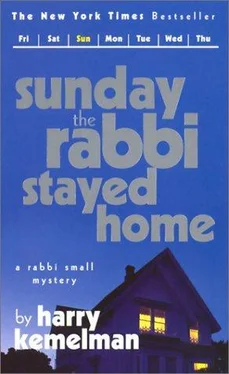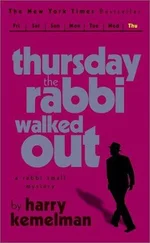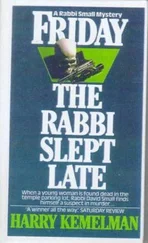Harry Kemelman - Sunday the Rabbi Stayed Home
Здесь есть возможность читать онлайн «Harry Kemelman - Sunday the Rabbi Stayed Home» весь текст электронной книги совершенно бесплатно (целиком полную версию без сокращений). В некоторых случаях можно слушать аудио, скачать через торрент в формате fb2 и присутствует краткое содержание. Город: New York, Год выпуска: 2002, ISBN: 2002, Издательство: iBooks, Жанр: Иронический детектив, на английском языке. Описание произведения, (предисловие) а так же отзывы посетителей доступны на портале библиотеки ЛибКат.
- Название:Sunday the Rabbi Stayed Home
- Автор:
- Издательство:iBooks
- Жанр:
- Год:2002
- Город:New York
- ISBN:978-0743452380
- Рейтинг книги:3 / 5. Голосов: 1
-
Избранное:Добавить в избранное
- Отзывы:
-
Ваша оценка:
- 60
- 1
- 2
- 3
- 4
- 5
Sunday the Rabbi Stayed Home: краткое содержание, описание и аннотация
Предлагаем к чтению аннотацию, описание, краткое содержание или предисловие (зависит от того, что написал сам автор книги «Sunday the Rabbi Stayed Home»). Если вы не нашли необходимую информацию о книге — напишите в комментариях, мы постараемся отыскать её.
Sunday the Rabbi Stayed Home — читать онлайн бесплатно полную книгу (весь текст) целиком
Ниже представлен текст книги, разбитый по страницам. Система сохранения места последней прочитанной страницы, позволяет с удобством читать онлайн бесплатно книгу «Sunday the Rabbi Stayed Home», без необходимости каждый раз заново искать на чём Вы остановились. Поставьте закладку, и сможете в любой момент перейти на страницу, на которой закончили чтение.
Интервал:
Закладка:
If he says something that you can show is similar to your position, point it out to him, even if you have to twist his words a little to make it fit. The psychology of that is that he’s anxious to get off the hook, and you’re giving him a face-saving out.
“Then why/ Gorfinkle interposed swiftly, “have you consistently objected to our program. Rabbi? It’s what we want, that the membership realize the temple is part of the world and has a role to play in the world.”
“I don’t object to your program as a program, although I think each individual should decide these things for himself. What concerns me is that it tends to antagonize the other party to the point where there is danger that they will actually leave the temple organization. I have seen signs of it for some time at the board meetings. In all fairness, the other side has been equally intemperate. There has been little or no discussion on the merits of issues these last few months. Rather, what your side has proposed the others have opposed, and when they made suggestions, they were similarly treated by your group and for the same reason. No organization can survive that kind of feuding. In the last few days, however, you have discarded what little propriety you have up till now maintained. Mr. Brennerman’s sermon—”
“What about his sermon?”
“He had no right to abuse the privilege of the pulpit in that way.”
“Just a minute, Rabbi. I heard that speech, and you didn’t. Taking it as a whole. I approved of it.” Gorfinkle’s lips turned up in his humorless smile.
“Then you are equally guilty, Mr. Gorfinkle.”
“You forget that I am the president—”
“Of the temple organization. Mr. Gorfinkle. The pulpit belongs to the rabbi.”
“I didn’t know that, Rabbi,” said Gorfinkle mildly. “Is that Jewish law?”
“It is the law of common courtesy! As rabbi. I am superintendent of the religious school. Would I presume to take over a class from one of the teachers without first asking his permission?”
It is sometimes worthwhile to yield a minor point.
“Well maybe Ted did get a little out of line. He’s enthusiastic and gets carried away.”
“And yesterday at the board meeting, you nominated Roger Epstein as chairman of the Ritual Committee.”
“What’s wrong with Roger Epstein?” Gorfinkle demanded indignantly.
“Nothing as a person. But he has had no temple background whatsoever and never attended one until coming here. The chairman of the Ritual Committee approves the order of the services. Under the circumstances. Mr. Paff s group, which tends toward Conservatism, might consider it a deliberate affront.”
“Now hold on. Rabbi. I picked Roger because the Ritual Committee is the most important and he’s my best friend. I’m not worried about his ignorance of the order of the service. I figure you and the cantor between you pretty much arrange that. But the chairman of the Ritual Committee distributes the honors on the holidays. Our people set great store by these honors and rightly so. I notice all the time Meyer Paff was chairman of the Ritual Committee he made political hay out of it. But while we’re speaking of impropriety. Rabbi, how about the impropriety of getting a bunch of kids together, including my own son, and lecturing them on these matters from the opposition point of view? Isn’t that abusing your privilege?”
“Kids? We accept the thirteen-year-old as a member of a minyan. He can be called to the reading of the Torah, which is instruction to the congregation. He can even lead the services. Can we say that bright young college people of eighteen and nineteen are too immature to understand what is going on in their temple community?”
“Look, Rabbi, I don’t want any of your Talmudic runaround. I consider that politics, and I’m telling you I want it stopped.”
The rabbi smiled. “You mean, you want me to stop talking to the young people?”
“I mean that you are not to talk to them about temple affairs. And I’m not asking you. I’m ordering you.”
“You can’t, /am the rabbi here, and it is for me to decide what I shall say to the members of the Jewish community.”
There comes a point in your discussion when you realize there’s no chance of an agreement or reconciliation. When you reach that point, don’t pussyfoot. Lower the boom and lower it all the way.
Gorfinkle nodded. “You’ve said enough, Rabbi, to prove to me that you’re part and parcel of Paff s apparatus. I’m not surprised. I suspected as much, as did the members of my group. We had a meeting last night, and I remind you that we represent a clear majority of the board. It was agreed that I was to talk to you and point out to you the impropriety of your behavior in the hope of bringing about a change. That’s what this little conference is all about. But when I give them the gist of this conversation, along with your cavalier attitude toward religion in general, which has just recently come to my attention. I am sure they will vote to terminate your association with us.
“Of course, you can fight it, but you’re a smart man, and I’m sure you realize that for a rabbi to fight for his job and lose is to jeopardize his chances of getting another. I can tell you now that you will lose and that after that meeting you won’t be rabbi any longer.” He rose to his feet in sign that the conference was over.
“I did not get my smicha from you.” said the rabbi, also rising, “and you can’t withdraw it. I am the rabbi of the Jewish community of Barnard’s Crossing. The temple pays me, but I am not the creature of the temple, and I do not need a temple or synagogue to fulfill my function.”
Outside there was the loud and persistent sound of an automobile horn.
Gorfinkle shrugged. “I’m sorry. Rabbi.” he said smoothly. “That’s Stu now, and I have to go.”
Chapter Twenty-Three
Wilcox, his collar unbuttoned, his tie unknotted, the ends hanging loose, sat back in his armchair, his legs resting on a hassock, at peace with the world. He could tell from the way it started that this was going to be one of those all-the-time-in-the-world trips, where time slowed down to a deep, throbbing rhythm. He could hear the slow, steady movement of the gears inside his watch. And then, as if in accompaniment, he heard the pealing of the doorbell, a deep, insistent throbbing. He rose to his feet to answer. It was no simple motion, but a whole series of adventures in which each part of his body, each member, played some significant role, like a complicated army maneuver, or like a ballet in which his arms and legs, his hands, his fingers all had separate roles. All had to move at their appointed time. And although it seemed that the act of opening the door and admitting his visitor and then going back to his easy chair was a matter of hours, he had no feeling of exhaustion from this tremendous effort. The figure in the chair before him grew larger and larger, like an inflating balloon. And then smaller and smaller and then once again larger. And yet this shifting of outline was not alarming in any way. Amusing, rather, especially when he realized it was only the man’s normal respiration he was watching. Thinking about it quite objectively he came to the conclusion that the man must have run up the stairs, because he seemed to be breathing heavily; there were beads of perspiration on his forehead that he could see individually course down from the hairline until they fell into and filled and overflowed a furrow on the man’s brow and then spilled over to the next furrow, and the next, until finally they were dissipated in the hairy jungle of the man’s eyebrow. The man was saying something that he could understand perfectly, but it seemed too utterly ridiculous to merit his attention. Something about having to park his car around the corner. Silly man. Why should that be of interest? And his difficulty in finding the apartment bell. Something about asking a woman which bell it was. What significance was there whether a woman knew which apartment it was or not. The man had a grievance. He understood it. He could understand it not merely in his mind, but it registered as waves of resentment on his very skin. And it was unpleasant. And he wanted an end to it. He spoke from a great distance, explaining for the silly creature. And it seemed that the other understood, for he rose from his chair. Not a bright person certainly. Not with man’s intelligence. No. Nor the intelligence of a dog even. Or even of a much lower animal. Not even the intelligence of a worm. Perhaps a microbe, because instead of going toward the door as he was told he was coming toward him. Ah, he understood at last. The other was taking his leave formally. Should he rise? Should he offer his hand? But the man was reaching forward and taking not his hand, but both ends of his tie. Was this the wav to take one’s leave? Was this a new ceremony? And then he felt the stricture on his neck and then pain and pressure and pressure and pain.
Читать дальшеИнтервал:
Закладка:
Похожие книги на «Sunday the Rabbi Stayed Home»
Представляем Вашему вниманию похожие книги на «Sunday the Rabbi Stayed Home» списком для выбора. Мы отобрали схожую по названию и смыслу литературу в надежде предоставить читателям больше вариантов отыскать новые, интересные, ещё непрочитанные произведения.
Обсуждение, отзывы о книге «Sunday the Rabbi Stayed Home» и просто собственные мнения читателей. Оставьте ваши комментарии, напишите, что Вы думаете о произведении, его смысле или главных героях. Укажите что конкретно понравилось, а что нет, и почему Вы так считаете.












